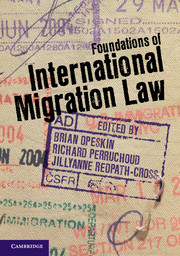Book contents
- Frontmatter
- Summary contents
- Detailed contents
- Preface
- List of case studies
- List of boxes
- List of figures
- List of maps
- List of tables
- Notes on contributors
- Abbreviations
- 1 Conceptualising international migration law
- 2 Contemporary patterns of international migration
- 3 Sources of international migration law
- 4 Nationality and statelessness
- 5 State sovereignty and freedom of movement
- 6 International human rights of migrants
- 7 Refugees and asylum
- 8 Women, children and other marginalised migrant groups
- 9 Human trafficking and smuggling
- 10 International migration by sea and air
- 11 International labour migration
- 12 International trade law and labour mobility
- 13 Global migration institutions and processes
- 14 Regional processes, law and institutional developments on migration
- 15 Emerging legal issues in international migration
- Appendix 1 Cases
- Appendix 2 Treaties and other international instruments
- Glossary
- Index
- References
4 - Nationality and statelessness
Published online by Cambridge University Press: 05 November 2012
- Frontmatter
- Summary contents
- Detailed contents
- Preface
- List of case studies
- List of boxes
- List of figures
- List of maps
- List of tables
- Notes on contributors
- Abbreviations
- 1 Conceptualising international migration law
- 2 Contemporary patterns of international migration
- 3 Sources of international migration law
- 4 Nationality and statelessness
- 5 State sovereignty and freedom of movement
- 6 International human rights of migrants
- 7 Refugees and asylum
- 8 Women, children and other marginalised migrant groups
- 9 Human trafficking and smuggling
- 10 International migration by sea and air
- 11 International labour migration
- 12 International trade law and labour mobility
- 13 Global migration institutions and processes
- 14 Regional processes, law and institutional developments on migration
- 15 Emerging legal issues in international migration
- Appendix 1 Cases
- Appendix 2 Treaties and other international instruments
- Glossary
- Index
- References
Summary
PRINCIPLES OF NATIONALITY
The concept of nationality
Nationality is essentially an institution of domestic law, but it has consequences in international law. Under domestic law, a national owes a duty of allegiance to the State, and may be obliged to pay taxes and render military service to that State. A national has the right of permanent residence and the right to participate in public life and, in most States, enjoys social benefits available only to nationals. Under the laws of some States, criminal jurisdiction may be exercised over a national even in respect of crimes committed abroad.
Nationality is a key concept in international migration law. The ability of individuals to change their residence to another State, or even to travel abroad temporarily for business or pleasure, is constrained by questions of nationality. Nationality is also important in international law generally. Until the emergence of human rights law in the era of the United Nations, how a State treated its own nationals was regarded as a matter of exclusive domestic jurisdiction and not subject to international law. However, States did have international obligations towards foreign nationals in their territory, and a foreign State could defend the interests of its nationals if they were breached by the host State. Thus, the rights of individuals were mediated through the bond of nationality. The foreign State could act on behalf of its nationals by exercising the right of ‘diplomatic protection’, since an injury to a national was regarded as an injury also to the State of which he or she is a national.
- Type
- Chapter
- Information
- Foundations of International Migration Law , pp. 93 - 122Publisher: Cambridge University PressPrint publication year: 2012
References
- 3
- Cited by



